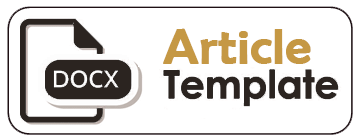Pemanfaatan Konten Media Sosial Instagram dan Blog dalam Peningkatan Literasi Penelitian pada Mahasiswa Program Studi Perpajakan
Abstract
Program Pengabdian kepada Masyarakat (PKM) ini bertujuan meningkatkan literasi riset perpajakan melalui media digital, khususnya blog dan Instagram Tax Talks ID sebagai sarana pembelajaran interaktif. Program ini menyajikan konten edukatif berupa artikel, infografis, dan video secara sistematis untuk memperluas akses metodologi riset bagi mahasiswa dan akademisi. Kegiatan dilakukan melalui tahap perancangan, implementasi, dan evaluasi. Hasilnya menunjukkan peningkatan jumlah konten, kunjungan blog oleh 220 pengguna, serta interaksi tinggi di Instagram dengan 249 pengikut. Lebih dari 80% peserta merasa puas dengan materi yang diberikan. Temuan ini menegaskan efektivitas media digital sebagai solusi inovatif dalam mendukung pembelajaran riset perpajakan. Dengan pendekatan berkelanjutan, Tax Talks ID berpotensi menjadi pusat pembelajaran digital yang memperkuat keterampilan penelitian mahasiswa di era digital.
Downloads
References
Abu Bakar, Siti Anis Nadia, Afidah Sapari, and Vani Tanggamani. 2023. “Technological Advancements: Does It Really Matter In Tax Education?” International Journal of Academic Research in Business and Social Sciences 13 (11). https://doi.org/10.6007/IJARBSS/v13-i11/19197.
Alenazy, W. M., W. Mugahed Al-Rahmi, and M. S. Khan. 2019. “Validation of TAM Model on Social Media Use for Collaborative Learning to Enhance Collaborative Authoring.” IEEE Access 7:71550–62. https://doi.org/10.1109/ACCESS.2019.2920242.
Al-Fraihat, Dimah, Mike Joy, Ra’ed Masa’deh, and Jane Sinclair. 2020. “Evaluating E-Learning Systems Success: An Empirical Study.” Computers in Human Behavior 102 (January):67–86. https://doi.org/10.1016/j.chb.2019.08.004.
Arceneaux, Phillip C, and Lucian F Dinu. 2018. “The Social Mediated Age of Information: Twitter and Instagram as Tools for Information Dissemination in Higher Education.” New Media & Society 20 (11): 4155–76. https://doi.org/10.1177/1461444818768259.
Bornman, Marina, and Pusheletso Ramutumbu. 2019. “A Conceptual Framework of Tax Knowledge.” Meditari Accountancy Research 27 (6): 823–39. https://doi.org/10.1108/MEDAR-09-2018-0379.
Cui, Wei. 2019. “The Superiority of the Digital Service Tax over Significant Digital Presence Proposals.” SSRN Electronic Journal. https://doi.org/10.2139/ssrn.3427313.
Essig, Jeremiah, Madison Watts, Gary L. Beck Dallaghan, and Kurt O. Gilliland. 2020. “InstaHisto: Utilizing Instagram as a Medium for Disseminating Visual Educational Resources.” Medical Science Educator 30 (3): 1035–42. https://doi.org/10.1007/s40670-020-01010-2.
Hamid, Nadiah, Suzana Saruji, Roszilah Shamsuddin, and Rani Othman. 2023. “Determining the Factors of Tax Agents’ Readiness Towards the Digitalisation of Tax Administration.” Review of Economics and Finance 21:32–42. https://doi.org/10.55365/1923.x2023.21.4.
Haq, Faizal Akhsan, and Deden Tarmidi. 2024. “Trust in Government, Tax Digitalization and Tax Education Influence Tax Compliance with Experience as a Moderation.” Educoretax 4 (8): 994–1005. https://doi.org/10.54957/educoretax.v4i8.1013.
Hussain, Ishrat, Ciana Dsouza, Sharon Wing Lam Yip, Matthew Flynn, and Mohammed Ahmed Rashid. 2024. “#Anatomynotes: A Temporal Content Analysis of Anatomy Education Posts on Instagram.” Anatomical Sciences Education 17 (2): 227–38. https://doi.org/10.1002/ase.2356.
Jabli, Naif Mohamed, Adel Ibrahim Qahmash, S. H. Almutairy, and Ahmed Sadek Abdelmagid. 2024. “Integration between Digital Platforms and Artificial Intelligence Applications on the Development of Engagement Skills in Learning among University Students.” Power System Technology 48 (1): 01–23. https://doi.org/10.52783/pst.233.
Kolmykova, Marina, Nadezhda Gavrilovskaya, Mariya Barsukova, and Daria Kozlovskaya. 2021. “Use of Microblogging, Social Networking, and Short Messages in E-Learning for Information Culture Building.” International Journal of Emerging Technologies in Learning (IJET) 16 (14): 22. https://doi.org/10.3991/ijet.v16i14.22391.
Nainggolan, Sudung. 2021. “Evaluating of Digital Platforms Related Online Learning During Covid-19 Pandemic: Students’ Satisfaction View.” AL-ISHLAH: Jurnal Pendidikan 13 (2): 1358–65. https://doi.org/10.35445/alishlah.v13i2.912.
Pal, Debajyoti, and Vajirasak Vanijja. 2020. “Perceived Usability Evaluation of Microsoft Teams as an Online Learning Platform during COVID-19 Using System Usability Scale and Technology Acceptance Model in India.” Children and Youth Services Review 119 (December):105535. https://doi.org/10.1016/j.childyouth.2020.105535.
Putra, Suadi Sapta, and Kumba Digdowiseiso. 2024. “The Impact of Social Media Marketing on Increasing Individual PPH and PNBP in Indonesia: A Systematic Literature Review.” Atestasi : Jurnal Ilmiah Akuntansi 7 (1): 29–39. https://doi.org/10.57178/atestasi.v7i1.747.
Salakhova, Valentina B., Maria A. Erofeeva, Elena V. Pronina, Natalia V. Belyakova, Natalia Zaitseva, and Izida I. Ishmuradova. 2021. “State Regulation and Development of Digital Educational Platforms.” World Journal on Educational Technology: Current Issues 13 (4): 956–66. https://doi.org/10.18844/wjet.v13i4.6282.
Shetye, Saurabhi, and Dr. Gayatri Indrakanti. 2023. “Examining The Contribution Of Educational Institutions In Fostering Digital Media Literacy: An Analysis Of The Impact Of Curriculum Integration Of Digital Media Training On Students’ Skill Development.” Journal for ReAttach Therapy and Developmental Diversities, August. https://doi.org/10.53555/jrtdd.v6i8s.2846.
Songkram, Noawanit, Suparoek Chootongchai, Sawaros Thanapornsangsuth, Hathaiphat Osuwan, Krerk Piromsopa, Yootthana Chuppunnarat, and Nutthakorn Songkram. 2023. “Success Factors to Promote Digital Learning Platforms: An Empirical Study From an Instructor’s Perspective.” International Journal of Emerging Technologies in Learning (IJET) 18 (09): 32–48. https://doi.org/10.3991/ijet.v18i09.38375.
Tomczyk, Łukasz, Katarzyna Potyrała, Anna Włoch, Joanna Wnęk-Gozdek, and Nataliia Demeshkant. 2020. “Evaluation of the Functionality of a New E-Learning Platform vs. Previous Experiences in E-Learning and the Self-Assessment of Own Digital Literacy.” Sustainability 12 (23): 10219. https://doi.org/10.3390/su122310219.
Wadhwa, Vibhor, Surbhi Raichandani, George K. Vilanilam, Dane Van Tassel, Scott Jorgensen, and Kevin Wong. 2021. “Establishing an Online Educational Teaching File on Instagram for an Academic Radiology Department: Proof-of-Concept.” Academic Radiology 28 (5): 711–17. https://doi.org/10.1016/j.acra.2020.06.031.
Yunan, Zulfahmi Yasir, Abu Bakar Fahmi, Gilang Kumari Putra, and Muhammad Maududi. 2022. “Keterampilan Sosial Komunikasi Efektif Untuk Karang Taruna RW 13 Kelurahan Jatinegara Kecamatan Cakung Jakarta Timur.” ALAMTANA Jurnal Pengabdian Masyarakat UNW Mataram 03 (02).
Zhao, Haoyu. 2024. “Digital Platforms in Higher Education: Opportunities, Challenges, and Strategies.” Advances in Economics, Management and Political Sciences 116 (1): 118–22. https://doi.org/10.54254/2754-1169/116/20242447.
Copyright (c) 2025 Nurlita Sukma Alfandia

This work is licensed under a Creative Commons Attribution-NonCommercial-ShareAlike 4.0 International License.

.jpg)




